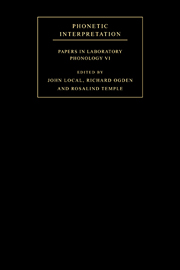Book contents
- Frontmatter
- Contents
- List of contributors
- Acknowledgements
- Introduction
- Part I Phonological representations and the lexicon
- 1 Interpreting ‘phonetic interpretation’ over the lexicon
- 2 Effects on word recognition of syllable-onset cues to syllable-coda voicing
- 3 Speech perception, well-formedness and the statistics of the lexicon
- 4 Factors of lexical competition in vowel articulation
- 5 Commentary: probability, detail and experience
- Part II Phonetic interpretation and phrasal structure
- Part III Phonetic interpretation and syllable structure
- Part IV Phonology and natural speech production: tasks, contrasts and explanations
- References
- Index of names
- Index of subjects
1 - Interpreting ‘phonetic interpretation’ over the lexicon
Published online by Cambridge University Press: 22 September 2009
- Frontmatter
- Contents
- List of contributors
- Acknowledgements
- Introduction
- Part I Phonological representations and the lexicon
- 1 Interpreting ‘phonetic interpretation’ over the lexicon
- 2 Effects on word recognition of syllable-onset cues to syllable-coda voicing
- 3 Speech perception, well-formedness and the statistics of the lexicon
- 4 Factors of lexical competition in vowel articulation
- 5 Commentary: probability, detail and experience
- Part II Phonetic interpretation and phrasal structure
- Part III Phonetic interpretation and syllable structure
- Part IV Phonology and natural speech production: tasks, contrasts and explanations
- References
- Index of names
- Index of subjects
Summary
The metaphors invoked
The phrase ‘phonetic interpretation’ (included in both special themes of the 6th Conference on Laboratory Phonology) invokes a particular view of language sound structure in which phonetics is defined as the semantics of phonology, which implies, conversely, that phonology is the syntax of phonetics. (See Pierrehumbert 1990, inter alia, for earlier explicit articulations of this view.) The paired metaphors are characteristic of a class of phonological theories built on symbolic formalism, just as the theory of ‘ordinary’ syntax is. They also delineate a class of psycholinguistic theories about how our memory of past experiences constrains our own phonological behaviour and our understanding of others' phonological behaviour. The utterances of other speakers are not apprehended and remembered as a collection of unanalysed audio-visual patterns. Nor are our own utterances produced by dredging up from memory the unanalysed articulatory records of some collection of previously produced utterances. Rather, utterances are decomposed into (or composed from) smaller parts that can be recognised as instances of particular syntactic categories standing in particular syntactic relationships to other categories in the context. Thus, phonological behaviour (like ‘ordinary’ syntactic behaviour) can be seen as a particularly elaborate type of categorisation, which allows for very complex and flexible stimulus generalisation. In this paper, we explore the cognitive function of categorisation, to try to understand its ecological advantage.
- Type
- Chapter
- Information
- Phonetic InterpretationPapers in Laboratory Phonology VI, pp. 13 - 37Publisher: Cambridge University PressPrint publication year: 2004



